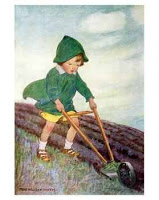
Children and Motivation
 How do you motivate your children?
How do you motivate your children?
I was recently asked this by a mother of children aged 5-12. As I struggled and groped to sound coherent I realised there isn’t a simple answer, as our self-discovery lies in years of parenting and the finding of each child’s unique ‘key’. Whilst short term motivation can be easier to obtain, the development of self-motivation is our aspiration and, I suspect my friend’s also.
When new parents, PC and I read Punished by Rewards: The Trouble with Gold Stars, Incentive Plans, A’s, Praise and Other Bribes – Alfie Kohn. Kohn maintains that the common strategy of managing people, children and adults alike, by dangling rewards, “do this and you’ll get that” works well in the short term. However in the long term it is ineffective and produces inferior work.
 Despite accepting Kohn’s studies, over the years in the interest of ‘short term sanity’ we have fallen into the reward/punishment trap. “If you complete all your tasks you may have …..(computer, DVD etc)” These short term motivations may work well for some children, but we have had only minimal success with our children as they are not strongly motivated by external forces. The last couple of years have bought about a strengthening of self-motivation in our children, we credit two keys to this development; maturity and habits.
Despite accepting Kohn’s studies, over the years in the interest of ‘short term sanity’ we have fallen into the reward/punishment trap. “If you complete all your tasks you may have …..(computer, DVD etc)” These short term motivations may work well for some children, but we have had only minimal success with our children as they are not strongly motivated by external forces. The last couple of years have bought about a strengthening of self-motivation in our children, we credit two keys to this development; maturity and habits.
Maturity is a ‘wondrous thing,’ so many times during our years of parenting I have agonized and worried about issues and then…maturity ‘kicks in’ and the problem corrects itself. Knowing when to wait and let matters resolve themselves, and when parental guidance is needed is an intuitive part of parenting.
 Habit formation is an integral foundation of Charlotte Mason philosophy. The cultivation of good habits aids a person in many areas of their internal and external life. “We know that to form in a child right habits of thinking and behaving is a parent’s chief duty, and that this can be done for every child definitely and within given limits of time. . . . ” (CM Series Vol. 2, p. 228).
Habit formation is an integral foundation of Charlotte Mason philosophy. The cultivation of good habits aids a person in many areas of their internal and external life. “We know that to form in a child right habits of thinking and behaving is a parent’s chief duty, and that this can be done for every child definitely and within given limits of time. . . . ” (CM Series Vol. 2, p. 228).
To aid our desire to form good habits, the last few years have seen our introduction of ‘expectation sheets’, these lesson goal sheets have clearly defined the parameters of what is expected and have helped our children achieve their goals. The creating of these goals is a joint effort between us and our children.
Most of all a regular routine has worked wonders, creating an inward rhythm. We strive to get up at a set time, go to bed at a regular time, begin at a consistent time, limit screen time etc.
Habits are best formed when we, the parents, lead by example. Our, both parents and children’s, formation is but a ‘work in progress’ and needing much improvement. Success in this area ebbs and flows, with progress and ‘backsliding’, we can but try, focusing on, good habits producing further good habits.






8 Comments
Eva
A friend of mine read the book you mentioned and was very impressed. She said that all teacher should read it. (She is a kindergarten teacher). A regular rhythm of the day works wonders, not just for children.
Melissa
Visiting your blog from mine 🙂 We're not strict CM'ers, but habit formation has to be the most useful idea I've come across in my reading, and the most effective in our homeschool.
If I relied on motivation – either internal or external – all the time, we'd be sunk!
Leanne
erin, this is a thought prevoking post. Its wisdom to know when to intervene. Routine I think is a key. We are teaching ad modelling routine. We too have a long way to go. Thanks
Life In A Pink Fibro
Great post Erin. So much to think about here. I wrote a feature a few years ago about motivating children, and I think your point about developing self-motivation is vital. The idea of habit is one that has worked well for us right from the start!
Maxabella
We use a 'marble in a jar' system with marbles in and out according to a chart we have set up about what is expected and isn't allowed. It works really well because I think it's something tangible for the children and we all agreed the rules beforehand so they really have a hand in what's allowable. Very self-motivating and they motivate each other to stay no track too. It's a nice little ritual at the end of the day. x
Carly @ Carly Webber - My Life in Colour
I have very young children and some developmental hurdles to overcome for my eldest so I really enjoy reading other Mothers experience with motivating learning as we step into new goals ourselves. I agree rhythm, consistency and habit are all keys to motivation and certainly bring out the best in my boy. I'm a new follower and I am sure I will learn some wonderful tips from you and your family – thank you for sharing!
Erin
Eva
Great to see you back over here:)
HI Melissa
motivation helps a little but not the real picture.
Leanne
Me too, I've a long way to go.
alison
Love to have the link to your post:)
Maxbella
I totally get what you mean about the visual.
carly
Welcome:) I love to have new followers:) I am humbly honoured, but still struggling myself.
Motivation
Giving rewards and punishments are good motivation for children but depending on a child's age and depending on the level of the desire for the reward given, but this strategy is not effective at all times because children at lower ages are sometimes hard headed, if they hear what's the reward waiting they would love to have it without doing anything.